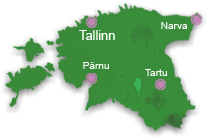| Companies | Tourist Attractions & Sightseeing | Map Search |
Start-ups in Estonia07.June 2012
ANIMAL spirits have long been soggy in the European Union, but they are thriving in one of its smallest countries. World Bank figures show that registrations of new limited companies (the commonest kind of start-up and a good indicator of entrepreneurial vim) were down by 12.1% in the EU in 2009, the latest year for which figures are available, with no signs of improvement since. But in Estonia over 14,000 enterprises have registered in 2011, 40% more than in the same period in 2008.
The data up to 2009 show that, barring a few jurisdictions that specialise in offshore registration, Estonia’s entrepreneurial record was the best in the industrialised world. Since then it has done even better. The smallest of the Baltic states has long had low taxes and clean government, not to mention high levels of internet penetration and technical education. A lingering sense of urgency in a region that returned to the map of the world in 1991 after a 50-year absence helps too. But the financial crisis that broke in 2008 has given an extra boost. Though it brought a 20% fall in GDP it also shook many talented people out of comfortable jobs and into start-ups.
Also noteworthy in a continent trying to keep its technological edge, around one in 16 of the Estonian start-ups was in high-tech industries. In January Seedcamp, an investment fund and entrepreneur mentoring programme, named an Estonian start-up, GrabCAD (a kind of Facebook for engineers), the winner of its 2011 competition in London. Of the 20 finalists, fully four were Estonian or had strong links to the Baltic state.
A big influence is Skype. The internet-telephony company (now part of Microsoft) runs on software written by four Estonians and has its headquarters in the capital, Tallinn. Daniel Vaarik, a local tech guru, says the founders “look like rock stars” to Estonians and inspire imitation. Estonia is also home to the biggest development centre of Playtech, the world’s largest publicly traded maker of gambling software.
The tiny talent pool in a country of 1.3m is both a burden and an incentive. Allan Martinson, a leading venture capitalist, says even one “decent-sized company” would struggle to fill all its slots with locals. Climate and language (the one cold, the other obscure) make it hard to bring in foreigners. Those from outside the EU may face bureaucratic obstacles, too.
But the small market forces ambitious entrepreneurs to think globally from the start. Click and Grow, for example, ships its stylish automated flowerpots (a kind of domestic hydroponics kit, pictured) to places as far afield as Azerbaijan, Japan and Brazil. Most other successful start-ups aim for similar niches, making life fun, rather than meeting mundane needs. Flirtic is an online dating and friendship site that uses quizzes to encourage users to complete their online profile rather than staying anonymous (the bane of most existing services). Sportlyzer enables users to share workouts with friends and research rivals in upcoming contests.
Estonia’s start-up culture is now a business on its own. Garage48, a scheme running two-day intensive bootcamps for potential entrepreneurs, has taken its hallmark events to Ghana, Kenya, Nigeria and Uganda—and in 2012 Mexico. These “hackathons” connect participants with investors and mentors from Silicon Valley and elsewhere: a rare chance for an African start-up. Next stop Greece?
Source: The Economist |




)
